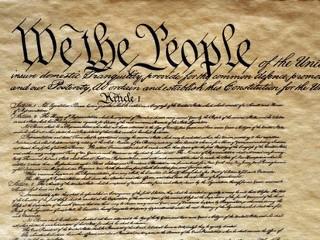 All laws in the United States are supposed to be in accordance with the United States Constitution, and any laws, rules, or state constitutional provisions that violate any part of the U.S. Constitution is null and void -- not legal. It says this in Article VI:
All laws in the United States are supposed to be in accordance with the United States Constitution, and any laws, rules, or state constitutional provisions that violate any part of the U.S. Constitution is null and void -- not legal. It says this in Article VI:This Constitution, and the Laws of the United States which shall be made in Pursuance thereof; and all Treaties made, or which shall be made, under the Authority of the United States, shall be the supreme Law of the Land; and the Judges in every State shall be bound thereby, any Thing in the Constitution or Laws of any State to the Contrary notwithstanding.The Senators and Representatives before mentioned, and the Members of the several State Legislatures, and all executive and judicial Officers, both of the United States and of the several States, shall be bound by Oath or Affirmation, to support this Constitution; but no religious Test shall ever be required as a Qualification to any Office or public Trust under the United States.
Note that Article VI also contains a provision that says no religious test shall be required to hold public office. That means no persons can be required to be a member of any religion in order to hold public office (whether it is an elected or appointed position), or to even be religious at all. That makes we wonder how the following six states can still have these provisions in their own state constitutions:
ARKANSAS (Article 19, Section 1)
"No person who denies the being of a God shall hold any office in the civil departments of this State, nor be competent to testify as a witness in any court."
MISSISSIPPI (Article 14, Section 265)
No person who denies the existence of a Supreme Being shall hold any office in this state.NORTH CAROLINA (Article 6, Section 8)
The following persons shall be disqualified for office: First, any person who shall deny the being of Almighty God.SOUTH CAROLINA (Article 17, Section 4)
No person who denies the existence of a Supreme Being shall hold any office under this Constitution.TENNESSEE (Article 9, Section 2)
No person who denies the being of God, or a future state of re- wards and punishments, shall hold any office in the civil department of this state.
TEXAS (Article 1, Section 4)
No religious test shall ever be required as a qualification to any office, or public trust, in this State; nor shall any one be excluded from holding office on account of his religious sentiments, provided he acknowledge the existence of a Supreme Being.These state constitutional provisions all violate the United States Constitution by making it illegal for atheists to hold public office. They try to limit Article VI by interpreting it to just mean belief in no "particular" religion is required, as long as there is a belief in god. But Article VI does not limit itself in that way. It simply says there will be no religious test, and requiring a belief in god to hold public office is certainly a religious test.
It is time for these archaic and unconstitutional provisions in these six state constitutions to be changed.

